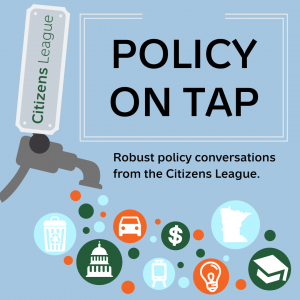Policy On Tap
A Citizens League Event Series
Season 1: Talking Trash
 The Citizens League is launching a new event series that will feature robust policy conversations around one central theme. For our first season, we’re Talking Trash.
The Citizens League is launching a new event series that will feature robust policy conversations around one central theme. For our first season, we’re Talking Trash.
Join us at Amsterdam Bar & Hall in St. Paul for these upcoming events:
- August 20: The Business Behind Your Trash
- September 24: The Science Behind Your Trash
- December 2: Sparking Joy and the World of Secondhand
> Click here to learn more about the events in this series.
Tickets for each event are $10, but you can buy a season pass now for $25 for the three remaining events!
Just complete the registration below, and you’re in!
Policy On Tap: Season 1 – Talking Trash
Very few of us know what happens after we leave our bins at the curb, take our stuff to a thrift store, or throw something in a bin at a restaurant. And the answer often depends on where that action happens.
It’s the epitome of “out of sight, out of mind.” And trash removal often is a heated policy debate (hello, St. Paul), even if you spend your days seeing if your stuff sparks joy.
The Citizens League is dedicated to robust conversations about policy and will convene four events to explore different aspects of the stuff we throw away. Moderated by former MPR host Tom Weber.
June 5 – An Apple a Day…Makes Waste
Of all the things we throw in landfills or incinerators, the single largest component is food — as much as two of every five pounds of waste (40%!).
The average household in St. Paul throws away almost $100 in food every month, according to the MPCA.
Food waste is a potential gold mine for reducing what goes into landfills and in saving us money. What are we doing to do just that? What policies should governments consider to help address the problem? And how well do current efforts, including composting, work?
Guests:
- Nancy Lo
Waste Reductions and Recycling Specialist, Hennepin County - JoAnne Birkenkamp
Senior Advocate, Healthy People & Thriving Communities Program, Natural Resources Defense Council
August 20 – The Business Behind Your Trash
Taking away your trash and recycling is mostly a for-profit endeavor in the United States. There are markets for the stuff we recycle and others for the gases created when our trash breaks down. We’ll discuss how these systems work. We’ll also discuss the critical disruptions happening right now, including China’s decision to stop taking our recycling.
For communities with big fights over how trash is collected, we’ll discuss other factors at play that you might not think about when you throw stuff away. And what policies should our cities and state be debating to ensure, for example, that we’re not adding to the plastics in the ocean?
Guests:
- Eric Roper
Minneapolis Star Tribune - Julie Ketchum
Waste Management - Lynn Hoffman
Eureka Recycling
September 24 – The Science Behind Your Trash
Congrats! You just finished that bottle of shampoo and are about to dispose it. What happens to that bottle if it goes into a trash can and ends up in an incinerator versus a landfill? And what happens to the bottle if it goes into a recycling bin?
We hear generic concepts often around how things break down or are repurposed for new use, but we’ll go deep into the chemistry and physics of each form of disposal. Which disposal gives off which gas, for example, and how are safeguards put in place?
Bring your lab coats as we get into the nerdy science of garbage!
(Just kidding. Don’t bring your lab coats.)
Guests:
- Jim Chiles, Minnesota Pollution Control Agency analyst
- David McNary, Assistant Director of Hennepin County’s Environment and Energy Department
December 3 – Sparking Joy and the World of Secondhand
We are in a moment where less is more (or at least better organized and more neatly folded). Marie Kondo’s book and TV series has people rushing to get rid of stuff, and business is booming at the local thrift store. But in truth, the secondhand industry is worldwide and it’s also big business.
As our parents age and we grapple with taking all their crap, what are the policy implications around a generation of children discarding a lot of stuff at once, often in the secondhand stream?
The best way to address the trash thing is to not buy stuff that will one day be trash. Easy enough concept but what are ways to actually live that out?
Guest:
Adam Minter, journalist and author of Secondhand: Travels in the New Global Garage Sale (release date November 2019)